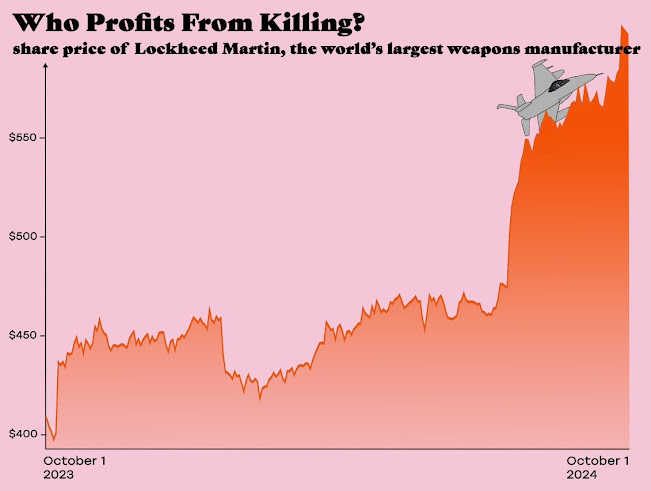Lockheed Martin, together with about 70 Australian suppliers, makes the F35 fighter jet currently being used by Israel to bomb Lebanon, Gaza, Syria and Yemen. Its share value has increased 50% since October 2023. It’s called making a killing.
On Monday 12 February, a Dutch appeals court ordered the government of the Netherlands to stop the export of F-35 jet fighter parts to Israel, citing a clear risk that the F-35 was being used to commit serious violations of international humanitarian law. In making this decision, the court relied on the Geneva Conventions and the Arms Trade Treaty. Consequently, Australia’s current permits for the export of F-35 parts to Israel are also likely to be illegal under international law. If Australia is serious about upholding an international rules-based order, Defence Minister Richard Marles must stop these exports immediately.
Both Australia and the Netherlands have signed and ratified the Arms Trade Treaty, and have recognised the international obligations arising from the treaty in domestic law. The treaty aims to reduce human suffering by limiting the availability of weapons for use in serious violations of international humanitarian law (aka ‘war crimes’). To achieve this, member states are required to refuse licences for the export of military goods where there is an overriding risk that the weapons will be used in such breaches. This requirement applies to both new and existing permits, meaning permits must be reassessed if the member state becomes aware that the goods are being used to commit war crimes.
The legal action in the Netherlands was brought by Oxfam and two other human rights organisations in relation to an export licence for a Lockheed Martin logistics hub for F-35 parts. The export licence was for export to several locations, including Israel. The appellants argued that the Dutch Minister for Foreign Trade and Development was obliged to reassess F-35 export licences once the overriding risk that the bomber was being used to commit and facilitate war crimes in Gaza became apparent. The court accepted this argument, finding that the F-35 bombers had been used in ‘indiscriminate attacks’ on civilians, and that there was a clear risk that these attacks amounted to breaches of international humanitarian law. In making these findings, the court relied on evidence from the United Nations and Amnesty International showing that almost half of the bombs dropped by Israel on Gaza are ‘dumb bombs’ (i.e. unguided bombs that are generally not precise) and that targets had included hospitals, schools, refugee camps, homes, markets and religious buildings. The court subsequently ordered the Netherlands government to stop all exports of F-35 parts within seven days.
The Dutch ruling has implications for the legality of Australia’s F-35 export program. At present, over 70 Australian companies supply parts and maintenance to these bombers. This program is also heavily subsidised by Australian taxpayers, with over $23 million having been paid out to F-35 contractors since 2011. Israel is already in possession of 50 F-35 craft and has placed an order for 25 more. It is a matter of public record that every F-35 contains some Australian parts. If the export licences do not explicit exclude Israel as a country of final destination, Australia is likely in breach of its obligations under the Arms Trade Treaty.
Australia’s weapons exports to Israel are increasingly a matter of concern to human rights groups and to the Australian public. There is legal action on foot to compel the government to release details of weapons exports to Israel. There are regular protests at Heat Tech Australia and Rosebank Engineering, two of the companies currently supplying F-35 parts to Israel, to shut these facilities down. Thus far such actions and protests from the Australian people have fallen on deaf ears. The government may not be willing to listen to the Australian people, but it is hoped that Defence Minister Richard Marles will, at a minimum, comply with Australia’s obligations under international law. Exports of F-35 parts to Israel must end.



Comments
Post a Comment